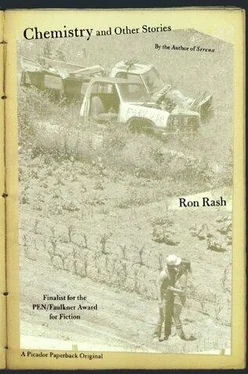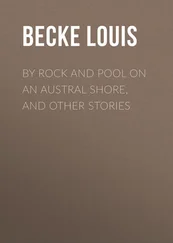“That’s mighty convenient,” Meekins said. “I don’t suppose anyone else actually saw this giant fish, or that you have a photograph.”
“No,” Creech said serenely. “But it’s way bigger than you are.”
Meekins shook his head. He no longer smiled. “Must be nice to have nothing better to do than make up stories, but this is getting old real quick.”
Rudisell stepped up to the truck’s window, only inches away from Meekins’s face when he raised his hand. A single diamond-shaped object was wedged between Rudisell’s gnarled index finger and thumb. Though tinted brown, it appeared to be translucent. He held it eye level in front of Meekins’s face as if it were a silty monocle they both might peer through.
“Acipenser fulvescens,” Rudisell said, the Latin uttered slowly as if an incantation. He put the scute back in his pocket and, without further acknowledgment of Meekins’s existence, stepped around the truck and onto the hardtop. Campbell followed with the fishing equipment and Creech came last with the book. It was a slow, dignified procession. They walked westward toward the store, the late-afternoon sun burnishing their cracked and wasted faces. Coming out of the shadows, they blinked their eyes as if dazzled, much in the manner of old-world saints who have witnessed the blinding brilliance of the one true vision.
The spring my father spent three weeks at Broughton Hospital, he came back to my mother and me pale and disoriented, two pill bottles clutched in his right hand as we made our awkward reunion in the hospital lobby. A portly, gray-haired man wearing a tie and tweed jacket soon joined us. Dr. Morris pronounced my father “greatly improved, well on his way to recovery,” but even in those first few minutes my mother and I were less sure. My father seemed to be in a holding pattern, not the humorous, confident man he had been before his life swerved to some bleak reckoning, but also not the man who’d lain in bed those April mornings when my mother called the high school to arrange for a substitute. He now seemed like a shipwreck survivor, treading water but unable to swim.
“All he needs is a hobby,” Dr. Morris said, patting my father’s back as if they were old friends, “to keep his mind off his mind.” The doctor laughed and straightened his tie, added as if an afterthought, “and the medicine, of course.” Dr. Morris patted my father’s back again. “A chemistry teacher knows how important that is.”
My father took half of Dr. Morris’s advice. As soon as we got home, he brought the steel oxygen tank clanging down from the attic and gathered the wet suit, mask, and flippers he hadn’t worn since his navy days. He put it all on to check for leaks and rips, his webbed feet flapping as he moved around the living room like some half-evolved creature.
“I’m not sure this was the kind of hobby Dr. Morris had in mind,” my mother said, trying to catch the eyes behind the mask. “It seems dangerous.”
My father did not reply. He was testing the mouthpiece while adjusting the straps that held the air tanks. That done, he made swimming motions with his arms as he raised his knees toward his chest like a drum major.
“I’ve got some repairs to make,” he said, and flapped on out to the garage. While my mother cooked a homecoming supper of pork chops and rice, he prepared himself to enter the deep gloaming of channels and drop-offs with thirty minutes of breath strapped to his back.
My father still wore his wet suit and fins when he sat down at the supper table that evening. He ate everything on his plate, which heartened my mother and me, and drank glass after glass of iced tea as if possessed by an unquenchable thirst. But when he lay his napkin on the table, he did not refill his glass with more tea and reach for the pill bottles my mother had placed beside his plate.
“You’ve got to take the medicine,” my mother urged. “It’s going to heal you.”
“Heal me,” my father mused. “You sound like Dr. Morris. He said the same thing right before they did the shock treatments.”
My mother looked at her plate.
“Can’t you see that’s exactly why you need to take the pills? So you won’t ever have to do that again.” She raised her napkin to blot a tear from her cheek, her voice a mere whisper now. “This is not something to be ashamed of, Paul. It’s no different from taking penicillin for an infection.”
But my father was adamant. He pushed the tinted bottles to the center of the table one at a time as if they were chess pieces.
“How can I teach chemistry if I’m so muddled I can’t find the classroom?” he said.
That spring my allegiances were with my mother, who anchored our family in ways I had not appreciated until my father lost his moorings. The following Monday my father resumed teaching, and I was her confederate at school. Between bells I peeked into a classroom filled with Styrofoam carbons and atoms wired together like fragile solar systems. In March Mr. Keller, the vice principal, had found my father crouched and sobbing in the chemical storage room, a molecular model of oxygen clutched in his hands, so it was with relief in those last weeks of my junior year that I found my father manning his desk between breaks, braced and ready for the next wave of students.
One morning he was looking up when my halved face appeared at his door. He saluted me sharply.
“Petty Officer Hampton reports no men overboard, sir,” he said to me.
“Well, at least he’s got his sense of humor back,” my mother said when I reported the incident.
IN MID — JUNE MY father announced at Sunday breakfast he was no longer a Presbyterian. Instead of sitting with us on the polished-oak pews of Cliffside Presbyterian, he would be driving up to Cleveland County’s mountainous northern corner to attend a Pentecostal church.
“It’s something I’ve got to do,” he said.
My mother laid her napkin on the table, looked at my father as if he’d just informed us he was defecting to Cuba.
“We need to talk, Paul,” she said. “Alone.”
My parents disappeared behind a closed bedroom door. I could hear my father’s voice, moderate and reassuring, or at least attempting to be. My mother’s voice, in contrast, was tense and troubled. They talked an hour, then dressed for church. I was unsure who’d prevailed until my father came out of the bedroom wearing not a suit but a shirt and tie. He cranked our decade-old Ford Fairlane and headed north into the mountains, as he would Sunday mornings and Wednesday nights for the rest of his life. Meanwhile, my mother and I drove our newer Buick Le Sabre in the opposite direction, down toward Broad River to Cliffside Presbyterian.
I was not made privy to what kind of understanding, if any, my parents had reached about my father’s change in church affiliation, but it was obvious as well as inevitable that my mother found this religious transmutation troubling. A lifelong Presbyterian, she distrusted religious fervor, especially for a man in such a tenuous mental state, but I suspect she also felt something akin to betrayal — a rejection of much of the life his marriage to her had made possible.
My mother had been baptized in Cliffside Presbyterian church, but my father, who’d grown up in the high mountains of Watauga County, had been Pentecostal before their marriage. His conversion signaled a social as well as religious transformation, a sign of upward mobility from hardscrabble Appalachian beginnings, for in this Scots-Irish community where Episcopalians were rare as Eskimos, he worshiped with the Brahmins of the county’s Protestant hierarchy.
My father had appeared a dutiful convert, teaching Sunday school, helping prepare the men’s breakfasts, even serving a term as an elder, but he’d been a subversive convert as well. On Sunday mornings he entertained me with caustic remarks about the propriety of the services and Presbyterians’ inability to sing anything remotely resembling a “joyful noise.” When the choir rose to sing, my father winked at me, pretended to stuff plugs in his ears. My mother looked straight ahead at such times, trying to ignore my father’s shenanigans, but her lips always tightened.
Читать дальше












